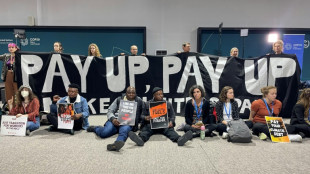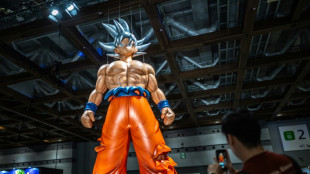
-
 Uganda opposition figure Besigye appears in military court
Uganda opposition figure Besigye appears in military court
-
General strike in Greece against cost of living

-
 UN nuclear chief welcomes Iran's 'concrete step' on uranium stockpile
UN nuclear chief welcomes Iran's 'concrete step' on uranium stockpile
-
Floods to shave 0.2 percentage points off Spain's growth

-
 Argentina's Contepomi makes one change for France Test
Argentina's Contepomi makes one change for France Test
-
'Steep climb' ahead as clock ticks on stalled climate talks

-
 Gatland changes four for Wales clash with South Africa
Gatland changes four for Wales clash with South Africa
-
'Sport will have the last word' as WRC title goes down to the wire in Japan

-
 Western powers move to censure Iran at UN nuclear meet
Western powers move to censure Iran at UN nuclear meet
-
US envoy presses Israel-Hezbollah truce bid in Lebanon visit

-
 'No controversy' around Alldritt exclusion for Argentina Test
'No controversy' around Alldritt exclusion for Argentina Test
-
Stock markets gain, dollar higher before Nvidia earnings

-
 New WHO financing mechanism put to the test
New WHO financing mechanism put to the test
-
Besigye kidnapping: Uganda president's doctor turned rival

-
 Star K-pop producer of NewJeans quits after legal spat with BTS agency
Star K-pop producer of NewJeans quits after legal spat with BTS agency
-
'Eternal' Nadal leaves legacy as he retires from tennis

-
 Vieira takes over at struggling Gerona
Vieira takes over at struggling Gerona
-
Australia's Kerevi banned for Morgan tackle

-
 Bellamy defies 'lunatic' reputation to inspire Wales revival
Bellamy defies 'lunatic' reputation to inspire Wales revival
-
Kremlin says US 'doing everything' to prolong 'war' in Ukraine

-
 Magritte painting nets auction record of $121 million
Magritte painting nets auction record of $121 million
-
Markets fluctuate as traders weigh geopolitical tensions

-
 N. Korea's latest weapon? Bombarding South with noise
N. Korea's latest weapon? Bombarding South with noise
-
'Kidnapped' Uganda opposition figure Besigye to appear at military court: lawyer

-
 Asian markets fluctuate as traders weigh geopolitical tensions
Asian markets fluctuate as traders weigh geopolitical tensions
-
'An inauspicious day': the landmines ruining Myanmar lives

-
 UN to vote again on Gaza ceasefire, US plans unclear
UN to vote again on Gaza ceasefire, US plans unclear
-
Japan's manga powerhouse 'Dragon Ball' turns 40

-
 Japanese, Koreans bottom of global love life survey
Japanese, Koreans bottom of global love life survey
-
Son blames 'mistakes' after South Korea held by Palestine in qualifier

-
 Japan ramps up tech ambitions with $65 bn for AI, chips
Japan ramps up tech ambitions with $65 bn for AI, chips
-
Lights, action, melodrama! Silent films get new reel at London haven

-
 Myanmar led world in landmine victims in 2023: monitor
Myanmar led world in landmine victims in 2023: monitor
-
ICC to sentence Timbuktu war criminal

-
 Ugandan opposition figure Besigye 'kidnapped', says wife
Ugandan opposition figure Besigye 'kidnapped', says wife
-
Australia's Jason Day eyes more major glory after resurgence

-
 Machu Picchu security boosted after visitors spread human ashes
Machu Picchu security boosted after visitors spread human ashes
-
Popovic hails Australia character in 'crazy' World Cup qualifier

-
 Taliban govt clearing 'un-Islamic' books from Afghanistan shelves
Taliban govt clearing 'un-Islamic' books from Afghanistan shelves
-
Argentina beat Peru as Uruguay hold Brazil

-
 Asian markets struggle as traders weigh geopolitical tensions
Asian markets struggle as traders weigh geopolitical tensions
-
Tatum stars as Celtics end Cavaliers unbeaten start

-
 Hurting India under pressure in blockbuster five-Test Australia series
Hurting India under pressure in blockbuster five-Test Australia series
-
'They killed her dream': Israel strike leaves woman footballer in coma

-
 Iraq holds its first census in nearly 40 years
Iraq holds its first census in nearly 40 years
-
Iraqis face tough homecoming a decade after IS rampage

-
 Russian net tightens around last civilians left in eastern Ukraine
Russian net tightens around last civilians left in eastern Ukraine
-
Olympic champion Tebogo aims to inspire next generation of African athletes

-
 Valencia on target as ten-man Ecuador upset Colombia
Valencia on target as ten-man Ecuador upset Colombia
-
'Rust' to premiere three years after on-set shooting


Nicaragua shutters 1,500 NGOs as crackdown continues
Nicaragua on Monday shuttered 1,500 NGOs, bringing to more than 5,000 the number of such entities scrapped in a crackdown on opponents by President Daniel Ortega.
The government has jailed hundreds of critics, real and perceived, since protests against his regime in 2018 that were met with a crackdown the UN said left more than 300 people dead.
Monday's announcement was the single-largest targeting of NGOs to date, bringing the total to more than 5,100.
Charges against the latest batch of entities, most of them religious, are that they had failed to declare their income, according to a government notice.
They will have their assets seized.
Ortega's government considers the 2018 protests an attempted coup d'etat promoted by the United States and backed by the religious community.
Last week, it passed a regulation requiring NGOs to work exclusively in "partnership alliances" with state entities.
The Nicaraguan Red Cross and several Catholic charities are among the NGOs shuttered to date, with many hit by charges dismissed as spurious.
Other targets have included rotary and chess clubs, sports associations and groupings of small traders, rural people and pensioners, as well as Catholic radio stations and universities.
Ortega's wife and vice president, Rosario Murillo, has described religious people as "children of the devil" or "agents of evil" who carry out "spiritual terrorism."
- 'Persistent repression' -
Last month, a group of United Nations experts slammed "systematic and widespread abuses of international human rights law" in the Central American country.
At the end of 2023, some 30 clerics were imprisoned and later ejected from the country and sent to the Vatican.
Also last year, the government expelled more than 300 politicians, journalists, intellectuals and activists, accusing them of treason.
At least 263 journalists have been forced to leave Nicaragua since the crackdown, a press freedom body said in July.
Ortega became the leader of Nicaragua first as a junta head in 1979, after fighting as a guerrilla in the Sandinista movement that toppled the US-backed Somoza family dictatorship. He was later elected as the country's president in 1985.
Beaten in elections in 1990, he returned to power in 2007 and has since quashed presidential term limits and seized control of all branches of the state.
His regime is under US and European Union sanctions.
Last week, the Inter-American Commission on Human Rights urged an end to "repression" in Nicaragua and the immediate release of those detained.
In a statement, it expressed concern "over the persistent repression in Nicaragua, characterized by religious persecution, the continuation of arbitrary detentions and the serious conditions in which those in prison remain."
One of Nicaragua's rare allies, Venezuela, passed a law last week against NGOs that critics said will be used to crack down on dissidents of President Nicolas Maduro, who has claimed a reelection victory widely disputed at home and abroad.
T.Wright--AT
